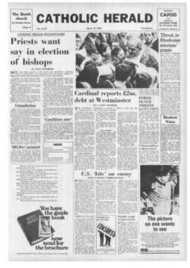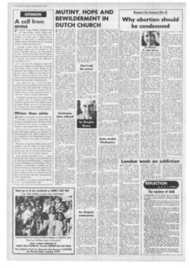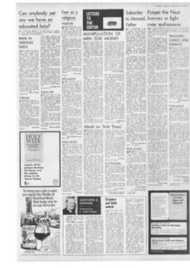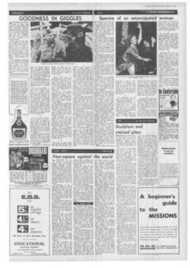Page 4, 14th March 1969
Page 4

Report an error
Noticed an error on this page?If you've noticed an error in this article please click here to report it.
Tags
Share
Related articles
Let's Have An Ecumenical Movement In The Church
Bishop In The Hot Seat Replies To Critics Of The Church...
The Assault On Faith And The Need For Silence
Uganda Shows The Way In People's Mass
One Mission Many Missionaries
MUTINY, HOPE AND BEWILDERMENT IN DUTCH CHURCH
I HAD read much about "those Dutch Catholics," and met some of them—in London. At a distance the avant-garde movement in Holland had looked so eccentric as to defeat its own purpose and lead to a hiving off from the Church of a small group of intellectuals whose departure, like that of Charles Davis, would make headline news for a time and then be largely forgotten.
But in Holland itself one soon realises that the movement, though it finds its extreme expression in such ratified circles as the Amsterdam University chaplaincy, has in varying degrees permeated the whole Church. What seems to be happening is the development of a completely new attitude to sacramental religion.
Let us begin with the Mass. In England we are familiar with the dispute as to whether this is primarily a sacrifice or a meal. In Holland it is already being presented liturgically in a manner designed to minimise its significance as eternity breaking through into time.
Hence there is a deiberate uncertainty about the moment of consecration. The Sanctus bell is silent and the congregation remain seated throughout the Canon, of which there are at least 13 authorised versions. Hassocks, indeed, have been removed from most churches, kneeling being regarded as too precise and time-bound an act of worship.
Confession time reduced The practice in the Amsterdam University chapel is for the sacred species to be distributed by the students themselves, who move among the congregation like waiters. With a polite word of thanks one accepts a piece of toasted bread and puts it into one's mouth. I did not find this particularly shocking in itself, but I realised its true significance when I enquired what would happen to the toast left over. "If it gets stale," I was told, "it will be thrown away."
The same desacralisation of religious acts is applied to the sacrament of penance. Auricular confession has almost ceased to be practised, at least in the towns. In one large Amsterdam parish, inhabited by solid burghers, the time for hearing confessions has been reduced to one half hour a week, when only two or three elderly penitents turn up, seemingly more ashamed of doing so than of their sins.
In Holland, indeed, one must throw away one's Penny Catechism. and learn a complete new set of categoriespluriformity, metanoia, demythologisation, and the rest. One needs the kind of crib so thoughtfully provided, on another plane, by the editors of Slant. It is all a leap into the dark, and a much more hazardous one than that made by Luther and Calvin four centuries ago. Where the Protestant Reformers were rebels the Dutch avant-garde are mutineers. They do not want to set up rival sects, for they scarcely believe in ecclesiastical institutions at all.
Like old-fashioned Marxists, who foresaw the withering away of the State, they expect church structures to disappear as irrelevant. For this reason, far from marching out of the historic Church, they defy anyone, from the Pope downwards, to expel them from it.
'Don't tell the priest
It is impossible to guess how many of Holland's five million Catholics accept these revolutionary ideas. Those who do not tend to be silent. When they speak they are patronisingly gainsaid by the products of the new university-type seminaries, by the greater part of the lively Catholic Press, and by the voluble laymen who get themselves elected to the diocesan and national pastoral councils.
There is certainly much bewilderment. I think of a crippled woman at Eindhoven who whispers that she is about to go on pilgrimage to Lourdes but adds: "Please say nothing about this if you meet my parish priest"; of an elderly man in Limburg who still takes his rosary to church but tells his beads in his waistcoat pocket so as not to cause scandal; of a family man in a suburb of The Hague, who seriously wonders whether he should stay away from church altogether when the price of Mass is listening to Woolwich type "heresies."
How do the local bishops deal with this phenomenon? They are Dutchmen themselves, and to some extent they have provoked it. The late beloved Bishop Bekkers. "the Dutch Pope John," some years ago started lay discussion groups on penance.
To a traditionalist this might have seemed as though a judge had called a conference of lawbreakers to consider court procedure. At any rate it marked the beginning of the end of private confession as a mainstay of Dutch spiritual life.
It will easily be understood that Humanae Vitae received short shrift in Holland. The National Pastoral Council passed a resolution declaring that the Pope's arguments against birth control were "unconvincing." Since this epithet had been suggested by Cardinal Alfrink himself, the battle over contraception was soon over in Holland—won or lost according to one's point of view.
An illogical compromise
But the crisis point has now been reached over that new controversy looming over the Latin Church, concerning clerical celibacy. When Father Vrijburg, one of the five strange Jesuits who have been entrusted with the spiritual welfare of Amsterdam students, gets married shortly, he will benefit from an unprecedented concession made by the Dutch Hierarchy. He may continue as ordained chaplain, provided that he neither officiates nor preaches at Eucharistic services.
The local Ordinary, Bishop Zwartkruis of Haarlem, had at first refused to allow any relaxation of the law of celibacy not approved by the universal Church. But to prevent the "student church" of Amsterdam from "going underground" he has now done so, and brought into existence a new kind of priest, licensed to hold bible services and exercise the care of souls, but not to offer the sacrifice of the Mass.
The compromise is not only illogical but illicit. It must represent the first open episcopal defiance of basic Church law since the Reformation that has not been immediately denounced from Rome. All the Dutch bishops have underwritten it, and hope to win the approval of the other Western European hierarchies at their meeting in Switzerland in July and then to take up the matter at the crucial Synod summoned for October in Rome.
The consequences of this compromise are even graver than might at first appear. The university Jesuits, in accepting it, have, as from next Sunday, arranged special non-Eucharistic services for Father Vrijburg's benefit, and have told the students that it will be for them to decide in conscience whether, in attending them, they will be fulfilling their Sunday obligation.
In other words, the Mass, as well as being partly desacramentalised, is in danger of losing its central place in Catholic worship at the instance of authorised Catholic priests.
Under such guidance there are aspects of the moral law that are equally called into question. If marriage, like the Mass; is a sacrament that transcends any particular moment in time, what happens if it fails to develop over the years, leaving the parties spiritually or emotionally at odds?
The editor of a leading Catholic newspaper, though himself a happy family man, told me that in his opinion this would justify what in civil law would be called a divorce, but what in the new moral theology could be regarded as an annulment.
Some nimble theologians
It is easier to list what is in danger of being destroyed in Dutch Catholicism than to describe what is being put in its place. The avant-garde see in their movement an extension of the spiritual insights of Vatican II. They cannot justify this from the texts, which are careful to maintain a doctrinal continuity which they themselves are willing to dispense with. But they are supported by some very nimble theologians, the astro-• nauts of modern religious thinking.
I admit that, when I had overcome my initial surprise, I was conscious of a reserve of spiritual energy at one of those do-it-yourself Masses in the chapel of St. Ignatius's high school which has become Amsterdam university's "experimental" church.
There were none of the normal symbols of Catholic piety and few outward signs of reverence; the atmosphere was more that of an earnest political meeting than of a congregation of worshippers. But to fill a large building with sudents four times each Sunday for an avowedly Christian purpose is not easy in these demonstrating days, especially when the sanction of divine commandment has been tacitly withdrawn.
Church attendances in general are falling off steeply in Holland, as are ordinations. This, the avant-garde will tell you, was a calculated risk. Certainly religious controversy among Catholics, though it ventures into realms unthought of here, seems quite free of bitterness.
There is a feeling of Pentecost in the air, tinged indeed with humanism and with the intellectual anarchy that is the vice of this age, but yet mysteriously shot through with faith, hope and charity.
It is this spirit that the bishops are loth to discourage. Yet who would be shepherd of such a hungry but uncontrollable flock? The Bishop of Haarlem is at present visiting England, and, if I had my way, his name would be mentioned in the bidding prayers at all our parish Masses this Sunday.
blog comments powered by Disqus











